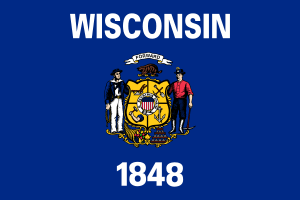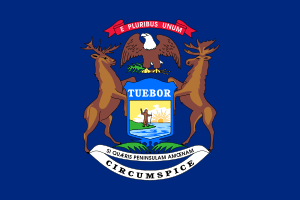Menominee County, Michigan
| Menominee County, Michigan | |
|---|---|
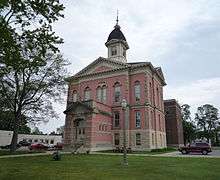 Menominee County Courthouse, Menominee | |
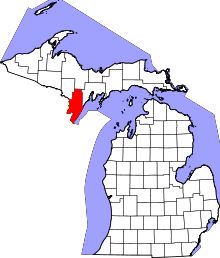 Location in the U.S. state of Michigan | |
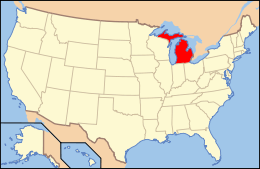 Michigan's location in the U.S. | |
| Founded | 1861, organized 1863[1] |
| Named for | Menominee tribe |
| Seat | Menominee |
| Largest city | Menominee |
| Area | |
| • Total | 1,338 sq mi (3,465 km2) |
| • Land | 1,044 sq mi (2,704 km2) |
| • Water | 294 sq mi (761 km2), 22% |
| Population | |
| • (2010) | 24,029 |
| • Density | 23/sq mi (9/km²) |
| Congressional district | 1st |
| Time zone | Central: UTC-6/-5 |
| Website |
www |
Menominee County is a county located in the Upper Peninsula in the U.S. state of Michigan. As of the 2010 census, the population was 24,029.[2] The county seat is Menominee.[3] The county's name comes from an American Indian word meaning "wild rice eater" used to describe a tribe. The county was originally created under the name of Bleeker in 1861. When county government was organized in 1863, the name was changed to Menominee.[1]
Menominee County is part of the Marinette, WI–MI Micropolitan Statistical Area.
Geography
According to the U.S. Census Bureau, the county has a total area of 1,338 square miles (3,470 km2), of which 1,044 square miles (2,700 km2) is land and 294 square miles (760 km2) (22%) is water.[4]
Major highways
Airport
Menominee-Marinette Twin County Airport (ICAO: KMNM), serves the county and surrounding communities.
Adjacent counties
- Marquette County (north/EST Border)
- Delta County (northeast/EST Border)
- Door County, Wisconsin (southeast)
- Marinette County, Wisconsin (southwest)
- Dickinson County (northwest)
Demographics
| Historical population | |||
|---|---|---|---|
| Census | Pop. | %± | |
| 1870 | 1,791 | — | |
| 1880 | 11,987 | 569.3% | |
| 1890 | 33,639 | 180.6% | |
| 1900 | 27,046 | −19.6% | |
| 1910 | 25,648 | −5.2% | |
| 1920 | 23,778 | −7.3% | |
| 1930 | 23,652 | −0.5% | |
| 1940 | 24,883 | 5.2% | |
| 1950 | 25,299 | 1.7% | |
| 1960 | 24,685 | −2.4% | |
| 1970 | 24,587 | −0.4% | |
| 1980 | 26,201 | 6.6% | |
| 1990 | 24,920 | −4.9% | |
| 2000 | 25,326 | 1.6% | |
| 2010 | 24,029 | −5.1% | |
| Est. 2015 | 23,548 | [5] | −2.0% |
| U.S. Decennial Census[6] 1790-1960[7] 1900-1990[8] 1990-2000[9] 2010-2013[2] | |||

The 2010 United States Census[10] indicates Menominee County had a population of 24,029. This is a decrease of 1,297 people from the 2000 United States Census. This is a -5.1% change in population. In 2010 there were 10,474 households and 6,819 families residing in the county. The population density was 23 people per square mile (9/km²). There were 14,227 housing units at an average density of 14 per square mile (5/km²). 95.3% of the population were White, 2.7% Native American, 0.3% Black or African American, 0.3% Asian, 0.2% of some other race and 1.2% of two or more races. 1.2% were Hispanic or Latino (of any race). 28.2% were of German, 13.1% French, French Canadian or Cajun, 8.4% Polish, 6.5% Swedish, 5.2% Irish and 5.2% American ancestry.[11]
There were 10,474 households out of which 24.0% had children under the age of 18 living with them, 51.1% were married couples living together, 9.1% had a female householder with no husband present, and 34.9% were non-families. 30.4% of all households were made up of individuals and 12.6% had someone living alone who was 65 years of age or older. The average household size was 2.26 and the average family size was 2.77.
In the county the population was spread out with 21.0% under the age of 18, 6.5% from 18 to 24, 20.8% from 25 to 44, 32.7% from 45 to 64, and 19.1% who were 65 years of age or older. The median age was 46.2 years. The population was 50.3% male and 49.7% female.
The median income for a household in the county was $42,014 and the median income for a family was $50,007. The per capita income for the county was $21,886. About 11.1% of people in families and 14.2% of the population were below the poverty line, including 22.6% of those under age 18 and 10.9% of those age 65 or over.
Government
The county government operates the jail, maintains rural roads, operates the major local courts, keeps files of deeds and mortgages, maintains vital records, administers public health regulations, and participates with the state in the provision of welfare and other social services. The county board of commissioners controls the budget but has only limited authority to make laws or ordinances. In Michigan, most local government functions — police and fire, building and zoning, tax assessment, street maintenance, etc. — are the responsibility of individual cities and townships.
Elected officials
- Prosecuting Attorney: Dan Hass
- Sheriff: Ken Marks
- County Clerk/Register of Deeds: Marc Kleinman
- County Treasurer: Diane Lesperance
- Drain Commissioner:
- Road Commissioners: William Anderson, Roger Betzinger, Anthony Kakuk
(information as of June 2013)[12]
Communities
Cities
- Menominee (county seat)
- Stephenson
Villages
Unincorporated communities
Townships
See also
- List of Michigan State Historic Sites in Menominee County, Michigan
- National Register of Historic Places listings in Menominee County, Michigan
References
- 1 2 "Bibliography on Menominee County". Clarke Historical Library, Central Michigan University. Retrieved June 25, 2013.
- 1 2 "State & County QuickFacts". United States Census Bureau. Retrieved August 28, 2013.
- ↑ "Find a County". National Association of Counties. Retrieved 2011-06-07.
- ↑ "2010 Census Gazetteer Files". United States Census Bureau. August 22, 2012. Retrieved September 27, 2014.
- ↑ "County Totals Dataset: Population, Population Change and Estimated Components of Population Change: April 1, 2010 to July 1, 2015". Retrieved July 2, 2016.
- ↑ "U.S. Decennial Census". United States Census Bureau. Retrieved September 27, 2014.
- ↑ "Historical Census Browser". University of Virginia Library. Retrieved September 27, 2014.
- ↑ "Population of Counties by Decennial Census: 1900 to 1990". United States Census Bureau. Retrieved September 27, 2014.
- ↑ "Census 2000 PHC-T-4. Ranking Tables for Counties: 1990 and 2000" (PDF). United States Census Bureau. Retrieved September 27, 2014.
- ↑ "Census 2010 American Fact Finder". Retrieved July 6, 2013.
- ↑ Data Access and Dissemination Systems (DADS). "American FactFinder". census.gov.
- ↑ "Menominee County Departments". Retrieved June 30, 2013.
External links
 |
Dickinson County | Marquette County | Delta County |  |
| |
||||
| ||||
| | ||||
| Marinette County, Wisconsin | Door County, Wisconsin |
Coordinates: 45°31′N 87°32′W / 45.52°N 87.53°W
